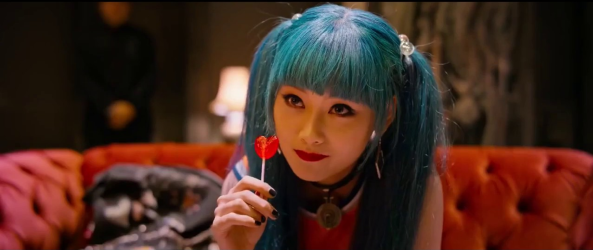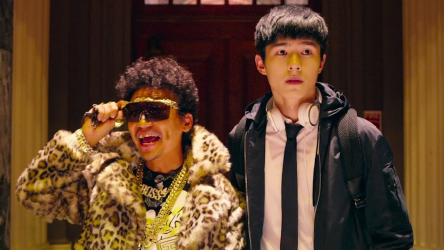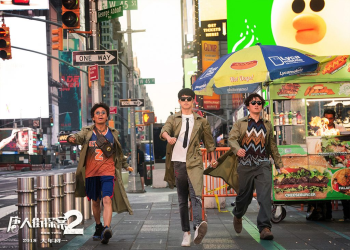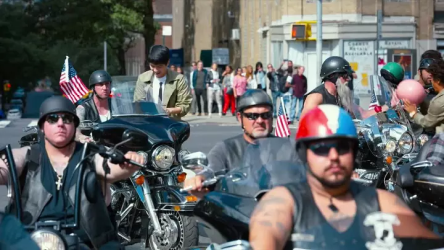The second feature of our not-Chinatown double-feature was, by contrast to the low-budget, low-key Shed Skin Papa, a big-budget smash hit in the top 10 for worldwide box office, the sequel to 2016’s very successful Detective Chinatown. And that phrasing throws me off every time. I want to say “Chinatown Detective”, as in a detective who works Chinatown, but the rearrangement is done by the comedic sidekick who, I dunno, thinks it’s cooler to put it that way. The sequel is massively successful, almost as much as Operation Red Sea, grossing over $550M, and managing to pull in nearly $2M here in the states.

Blue-haired faux-Japanese hacker girl with lollipop is intrigued by large sums of money.
It’s great. And it’s a great reminder of how messed up things are here in the USA. This movie could never be made here, in this day and age, and not least because it pokes fun at us while at the same time being very pro-America.
The plot, such as it is, involves goofy sidekick Tang (Biaoqiang Wang, A Touch Of Sin) luring his smarter pal Qin (Haoran Liu) to New York City under false pretenses to solve a detective challenge with 9 of the 10 greatest detectives of the world, as ranked by a game/social app of some kind. There’s been a murder, and an innocent man accused of being a serial killer, and if he isn’t cleared of it by the time a rich man dies, the money will all go to someone else. A somewhat extreme version of classic murder mystery trope. Murder mystery mashed with It’s a Mad, Mad, Mad, Mad, Mad World!

Which is the goofy sidekick?
Qin and his rivals (Satoshi Tsumabuki, Fast and Furious 6: Tokyo Drift and Yuxian Shang, who plays a blue-haired half-Japanese, half-Chinese computer geek) work the whole thing out in about 10 minutes. This was actually the only point in the film where I thought maybe it would’ve helped to see the original. But of course, there’s more going on, and Qin and Tang end up on the run with the accused murderer, getting deeper and deeper into trouble and deeper and deeper into the mystical, magical world of New York City.
Seriously, this movie loves New York City. The main theme reprised at points again and again, is all about how great NYC is and how you can do anything there and find your fortune. America generally is the land of opportunity. (There’s a cut toward the end to Japan, complete with the apparently obligatory shakuhachi, and Qin seems to regard it as a fate worse than death to have to go there.)

Look at how great NYC looks. And not a trace of dog piddle.
In New York City we learn that there are classes full of black people learning Chinese, and every one of them has a gun. That there are large tongs where (of course) everyone has a gun. That there are nice motorcycle gangs who also all carry guns, and will protect you, but then they’ll want to have sex with you. That the chief of police looks and sounds nearly identical to Donald Trump, and he panders to the Chinese because he needs their votes and there’s so many of them! That Chinese women do not regard black nurses as suitable companions for white doctors. Everyone in NYC speaks Chinese. It’s funny to teach people Chinese wrong, and to have learned English wrong. And so on.
It’s all in good fun, though. Remember that? Remember when you could broadly make fun of people and things and it didn’t really mean anything?

Like bikers being homosexuals. What does it mean? Nothing!
I assume the usual suspects, if they’re aware of this movie, know better than to draw any attention to it. With less than 1/2% of its box office coming from America, and The Boy and I being about the only white people in the theater when we were there, I doubt they’d have much sway.
Besides the comedy, there are some boffo special effects. We see Qin’s thought process as a series of materialized models that he smashes through. It’s damned exciting. This is another common theme of the Chinese movies especially: They will have spectacular CGI with no concern as to “realism”. It’s all about what looks good, and cool.
In addition, what we might call the anti-Rose-Tico rule: Everyone in Chinese movies is either beautiful or comic relief (or an old person, but even there, the law applies on a curve). The cast is ridiculously good looking. Just as an example, the Chinese/Italian/American Natasha Liu Bordizzo playing a chief detective, and she’s allowed to be sexy and competent without having to be omnipotent. (And of course Chinese people can be successful in America!)

It’s almost worth becoming a serial killer to be investigated by her.
There’s a third act climax where all the detectives are put in to prison while Bordizzo’s character is about to be murdered, and to get out, the other detectives help Our Heroes escape, and it’s a virtual parade of stereotypes and anti-stereotypes. Like, the Indian detective basically has Force powers. The fat, sassy black woman apparently is a Kung Fu master. It’s super broad, is what I’m getting at.
At the same time, it’s so good-natured that I couldn’t be offended if I tried. And it does the tone shifting from silly to serious and back without wrecking the characters. Yeah, it’s comic book sometimes, but we do want our characters to succeed and not be murdered, which is all you can ask.
We loved it. And it was super-easy to see what it was such a smash hit. We’re excited to see Detective Chinatown 3, whatever it may turn out to be.

The Kung Fu Master: Chinese will make fun of themselves, too.

3 thoughts on “Detective Chinatown 2”